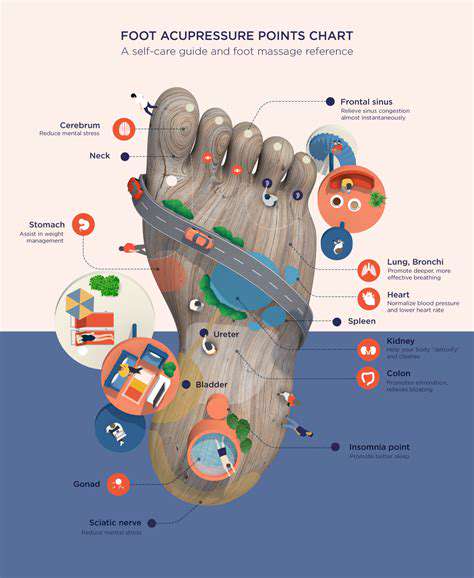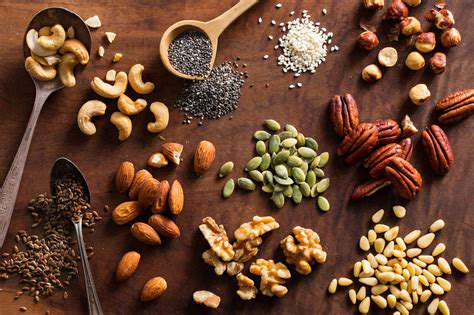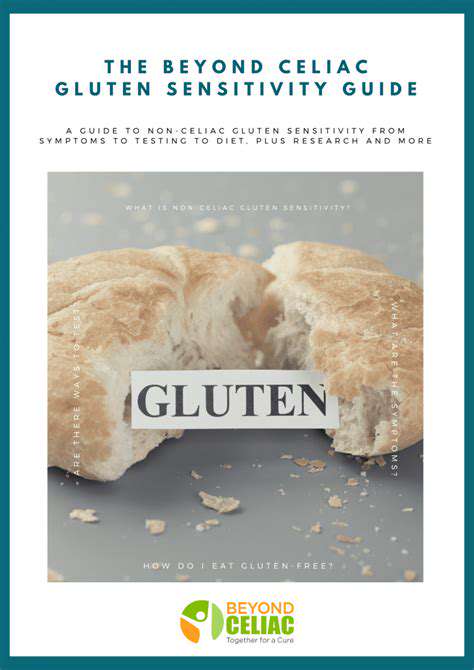The Role of Qi Stagnation in TCM
Qi stagnation, a concept central to Traditional Chinese Medicine (TCM), refers to an imbalance in the flow of vital energy, or qi, throughout the body. This energy, believed to be crucial for health and well-being, can become blocked or sluggish, leading to a variety of physical and emotional symptoms. Understanding qi stagnation is crucial for anyone seeking to understand their health from a TCM perspective.
This blockage can manifest in various ways, impacting different organs and systems. Identifying the specific patterns of stagnation and their corresponding symptoms is vital for effective treatment. This is where the expertise of a qualified TCM practitioner comes into play.
Underlying Causes of Qi Stagnation
Several factors can contribute to qi stagnation, encompassing lifestyle choices, emotional states, and even environmental influences. Emotional stress, such as prolonged anxiety or grief, is often implicated as a primary cause, as these emotions can disrupt the smooth flow of qi. Poor dietary habits, lack of exercise, and inadequate sleep can also disrupt the body's natural energy balance.
Disruptions in the flow of qi can create a cascade of negative effects. These effects can manifest as physical discomfort, emotional distress, and even a weakened immune system.
Symptoms Associated with Qi Stagnation
The symptoms of qi stagnation are diverse and often subtle, making diagnosis challenging. Common symptoms include digestive issues, such as bloating, indigestion, or constipation. They can also include fatigue, a sense of heaviness, and feelings of emotional stagnation. These subtle symptoms can easily be overlooked, thus highlighting the importance of awareness and proactive management.
Physical manifestation of Qi stagnation can include menstrual irregularities in women and chest tightness or pain in men. Understanding these connections is key to effective treatment.
Diagnosis and Treatment of Qi Stagnation
Diagnosing qi stagnation often involves a thorough assessment by a qualified TCM practitioner. This typically includes a detailed discussion of the patient's medical history, including lifestyle, diet, and emotional state. Physical examination and pulse diagnosis are also commonly used to identify patterns of qi stagnation.
Treatment strategies for qi stagnation are highly personalized. They may include acupuncture, herbal remedies, dietary adjustments, and lifestyle modifications. These techniques aim to restore the balance and free the flow of qi, promoting overall well-being and healing.
Maintaining Qi Balance for Optimal Health
Maintaining a healthy balance of qi is essential for overall well-being. This involves incorporating practices that promote emotional well-being, such as mindfulness and stress reduction techniques. A balanced diet rich in fresh fruits and vegetables is crucial. Regular exercise and sufficient sleep are also vital for maintaining a healthy flow of qi.
By understanding and addressing the factors that contribute to qi stagnation, individuals can cultivate a more holistic approach to health and well-being. This preventative care approach is fundamental to the philosophy of Traditional Chinese Medicine.
The Root Causes of Qi Stagnation: A Deeper Dive

Emotional Factors
Emotional imbalances are a significant contributor to qi stagnation. Chronic stress, anxiety, and unresolved grief can disrupt the natural flow of qi, leading to feelings of heaviness, tension, and stagnation in the body. These negative emotions can manifest physically, impacting digestion, sleep, and overall well-being. Understanding and addressing these emotional roots is crucial for restoring qi balance.
Suppressed emotions, such as anger, fear, or sadness, can also contribute to qi stagnation. Holding onto these feelings without processing or releasing them can create blockages in the energy pathways. Learning healthy coping mechanisms, such as mindfulness practices or talking to a therapist, can help release these pent-up emotions and restore the free flow of qi.
Dietary Imbalances
A diet lacking in essential nutrients or containing excessive processed foods and unhealthy fats can disrupt the body's natural energy flow. A diet heavy in overly processed foods or lacking in whole foods can seriously affect the body's ability to properly process energy. This can lead to a sluggish feeling and a sense of stagnation. Furthermore, inadequate hydration can hinder the proper transport of qi throughout the body, further contributing to stagnation.
Excessive consumption of cold or raw foods, particularly in individuals with a constitution that is more susceptible to cold, can also have a negative impact on the body's energy balance. This can lead to a feeling of coldness, heaviness, and a general sense of stagnation. Conversely, a diet consistently high in highly processed or refined foods, devoid of necessary nutrients, can also create a significant disruption in energy flow and contribute to stagnation.
A diet rich in fresh fruits, vegetables, and whole grains, balanced with adequate protein and healthy fats, supports the body's natural energy flow. Proper hydration is equally vital for maintaining qi balance and preventing stagnation.
Lifestyle and Environmental Factors
A sedentary lifestyle, lack of physical activity, and insufficient rest can contribute to qi stagnation. Regular exercise and movement are essential for promoting the flow of qi throughout the body and improving overall well-being. Conversely, a lack of physical activity can lead to a buildup of stagnant energy, causing feelings of heaviness and lethargy.
Environmental factors, such as prolonged exposure to stress, pollutants, or negative energy, can also influence qi stagnation. Finding ways to minimize exposure to these stressors and cultivate a supportive environment are crucial for maintaining healthy energy levels. Chronic exposure to negativity or stressful situations can contribute to a build-up of stagnant qi.
Insufficient sleep, irregular sleep schedules, and inadequate rest all disrupt the body's natural rhythm and contribute to qi stagnation. Prioritizing adequate rest and sleep is crucial for restoring energy balance and maintaining a healthy flow of qi.
Treating Qi Stagnation: Holistic Approaches in TCM
Identifying Qi Stagnation
Qi stagnation, a common concept in Traditional Chinese Medicine (TCM), refers to an imbalance in the flow of vital energy, or qi, throughout the body. This blockage can manifest in various ways, impacting physical, emotional, and mental well-being. Understanding the specific symptoms associated with Qi stagnation is crucial for appropriate diagnosis and treatment.
Recognizing the patterns of Qi stagnation is a key element in TCM. This involves considering not just physical symptoms, but also emotional states, lifestyle factors, and even dietary habits. A practitioner skilled in TCM can use a variety of diagnostic tools, including pulse diagnosis and questioning about the patient's experiences, to identify the specific location and nature of the qi stagnation.
Dietary Considerations for Qi Stagnation
Diet plays a vital role in managing and alleviating Qi stagnation. Foods that are considered cold, raw, or overly processed can often exacerbate the condition. TCM emphasizes incorporating warming, nourishing foods into the diet, which can help to restore balance and facilitate the smooth flow of qi. This might include foods like ginger, cinnamon, and warming soups, as well as a focus on fresh, seasonal produce.
Avoiding excessive consumption of cold or raw foods, especially during colder months, is also recommended. Furthermore, a balanced approach to meals, including incorporating plenty of fresh fruits and vegetables, is essential. The quality of ingredients and the preparation methods are vital aspects to consider when aiming to promote a healthy flow of qi.
Acupressure and Acupuncture for Qi Stagnation
Acupressure and acupuncture are powerful techniques in TCM for addressing Qi stagnation. Acupressure involves applying pressure to specific points on the body to stimulate the flow of qi. This can help to clear blockages and restore balance. Practitioners skilled in acupressure can identify the specific points that need attention, based on the individual's unique needs and symptoms.
Lifestyle Adjustments for Improved Qi Flow
Lifestyle modifications are fundamental to managing Qi stagnation. Stress reduction techniques, such as meditation, yoga, and tai chi, are highly valued in TCM for their ability to calm the mind and promote relaxation. These practices are believed to encourage the smooth flow of qi throughout the body.
Adequate sleep is also crucial for maintaining optimal qi. TCM emphasizes the importance of regular sleep patterns and a conducive sleep environment. Balancing work and rest, and incorporating activities that promote relaxation and rejuvenation, are integral aspects of this approach.
Herbal Remedies for Qi Stagnation Relief
Herbal remedies are a cornerstone of TCM treatment for Qi stagnation. Specific herbs are chosen to address the underlying imbalances and promote the free flow of qi. For example, certain warming herbs might be used to address cold stagnation, while others might be employed to address stagnation associated with specific organs. It's crucial to consult with a qualified TCM practitioner for personalized recommendations.
Consulting a skilled herbalist is critical when considering herbal remedies. Their expertise ensures the safe and effective use of herbs to support the body's natural healing processes. They can also help patients understand the potential interactions with other medications or conditions.
Beyond the Symptoms: The Importance of a Balanced Lifestyle
Understanding Qi Stagnation
Qi stagnation, a concept central to Traditional Chinese Medicine (TCM), describes an imbalance in the flow of vital energy throughout the body. This energy, or Qi, is believed to be essential for optimal physical and mental well-being. When Qi stagnates, it can manifest in various ways, impacting not only physical health but also emotional and mental states. This stagnation can arise from a multitude of factors, including stress, poor diet, and a lack of physical activity.
Understanding the underlying causes of Qi stagnation is crucial for effective treatment. Addressing the root causes of this imbalance, rather than just treating the symptoms, is often more beneficial in the long run. This approach emphasizes the interconnectedness of mind, body, and spirit in maintaining overall health.
Dietary Considerations for Qi Flow
A balanced diet plays a vital role in maintaining healthy Qi flow. Foods high in processed sugars and unhealthy fats can contribute to Qi stagnation, while fresh fruits, vegetables, and whole grains can support the free flow of energy. Incorporating foods rich in protein and fiber is also beneficial, as these nutrients aid in digestion and the absorption of essential nutrients, which are crucial for overall well-being.
It's important to pay attention to portion sizes and mindful eating practices. Overeating can hinder the smooth flow of Qi, while mindful eating can promote a better connection with your body's signals and help regulate appetite.
The Impact of Emotional Well-being
Emotional well-being is inextricably linked to the flow of Qi. Stress, anxiety, and unresolved emotions can disrupt the natural flow of energy, leading to Qi stagnation. Practicing mindfulness techniques, such as meditation or deep breathing exercises, can help manage stress and promote emotional balance. Seeking support from a therapist or counselor can also be beneficial for addressing underlying emotional issues.
Movement and Physical Activity
Regular physical activity is essential for promoting healthy Qi flow. Exercise helps to circulate blood and energy throughout the body, fostering a sense of well-being. Engaging in activities such as yoga, tai chi, or brisk walking can improve Qi circulation, reduce stress, and enhance overall health. Finding physical activities you enjoy can make incorporating them into your routine more sustainable and effective.
The Role of Sleep in Qi Balance
Adequate sleep is crucial for restoring and replenishing Qi. During sleep, the body repairs and rejuvenates itself, allowing Qi to flow freely. Establishing a consistent sleep schedule and creating a relaxing bedtime routine can significantly improve sleep quality. Creating a conducive sleep environment, free from distractions, can also contribute to a more restful night's sleep.
The Importance of Mindful Practices
Mindful practices, such as meditation and mindful movement, can help regulate the flow of Qi. These practices promote a state of awareness and presence, allowing you to connect with your body and mind. By paying attention to your breath and bodily sensations, you can become more attuned to imbalances in your energy flow. This heightened awareness allows for more targeted interventions to promote a balanced and healthy Qi.











